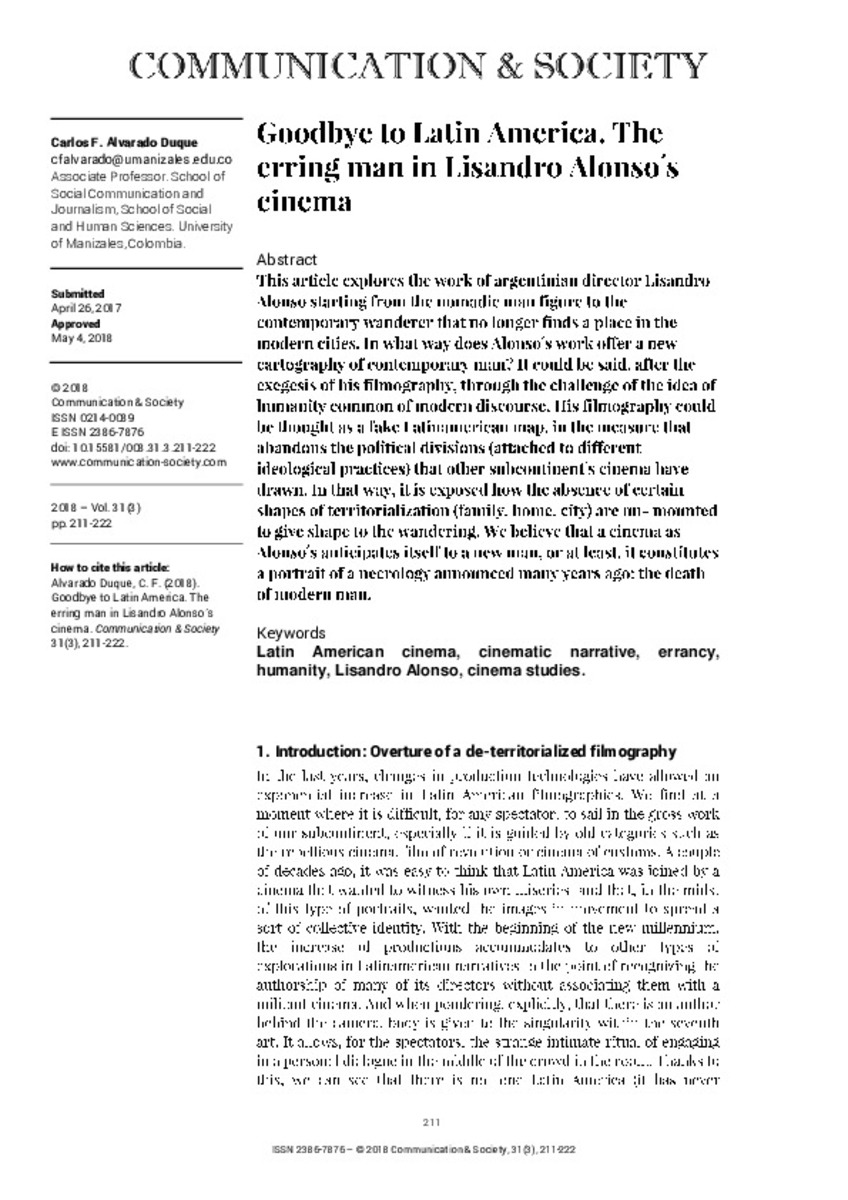Full metadata record
| DC Field | Value | Language |
|---|---|---|
| dc.creator | Alvarado Duque, C. (Carlos F.) | - |
| dc.date.accessioned | 2018-11-13T10:46:56Z | - |
| dc.date.available | 2018-11-13T10:46:56Z | - |
| dc.date.issued | 2018 | - |
| dc.identifier.citation | Alvarado Duque, C. (Carlos F.). "Goodbye to Latin America. The erring man in Lisandro Alonso´s cinema". Communication & Society. 31 (3), 2018, 211 - 222 | es |
| dc.identifier.issn | 2386-7876 | - |
| dc.identifier.uri | https://hdl.handle.net/10171/55791 | - |
| dc.description.abstract | This article explores the work of argentinian director Lisandro Alonso starting from the nomadic man figure to the contemporary wanderer that no longer finds a place in the modern cities. In what way does Alonso´s work offer a new cartography of contemporary man? It could be said, after the exegesis of his filmography, through the challenge of the idea of humanity common of modern discourse. His filmography could be thought as a fake Latinamerican map, in the measure that abandons the political divisions (attached to different ideological practices) that other subcontinent´s cinema have drawn. In that way, it is exposed how the absence of certain shapes of territorialization (family, home, city) are un- mounted to give shape to the wandering. We believe that a cinema as Alonso´s anticipates itself to a new man, or at least, it constitutes a portrait of a necrology announced many years ago: the death of modern man | es_ES |
| dc.description.abstract | Este artículo explora la obra del director argentino Lisandro Alonso a partir de la figura del hombre nómade, del errante contemporáneo que ya no encuentra lugar en las ciudades modernas. ¿De qué manera la obra de Alonso ofrece una nueva cartografía del hombre contemporáneo? puede decirse, tras la exégesis de su filmografía, que mediante el desafío a la idea de humanidad propia del discurso moderno. Bien puede pensarse en su filmografía como un falso mapa de Latinoamérica, en la medida en que abandona las divisiones políticas (aunadas a diferentes prácticas ideológicas) que otros cines del subcontinente han delineado. De esta manera, se pone en evidencia cómo la ausencia de ciertas formas de territorialización (familia, casa, ciudad) son des—montadas para dar cuerpo a la errancia. Creemos que en un cine como el de Alonso se anticipa un nuevo hombre o, por lo menos, se hace el retrato de una necrología anunciada hace varios años: la muerte del hombre moderno. | es_ES |
| dc.language.iso | eng | es_ES |
| dc.publisher | Servicio de Publicaciones de la Universidad de Navarra | es_ES |
| dc.rights | info:eu-repo/semantics/openAccess | es_ES |
| dc.subject | Latin American cinema | es_ES |
| dc.subject | Cinematic narrative | es_ES |
| dc.subject | Errancy | es_ES |
| dc.subject | Humanity | es_ES |
| dc.subject | Lisandro Alonso | es_ES |
| dc.subject | Cinema studies | es_ES |
| dc.title | Goodbye to Latin America. The erring man in Lisandro Alonso´s cinema | es_ES |
| dc.title.alternative | Adiós a Latinoamérica. El hombre errante del cine de Lisandro Alonso | es_ES |
| dc.type | info:eu-repo/semantics/article | es_ES |
| dc.publisher.place | Pamplona | es_ES |
| dc.identifier.doi | 10.15581/003.31.3.211-221 | es_ES |
| dadun.citation.endingPage | 222 | es_ES |
| dadun.citation.number | 3 | es_ES |
| dadun.citation.publicationName | Communication & Society | es_ES |
| dadun.citation.startingPage | 211 | es_ES |
| dadun.citation.volume | 31 | es_ES |
Files in This Item:
Statistics and impact
Items in Dadun are protected by copyright, with all rights reserved, unless otherwise indicated.






